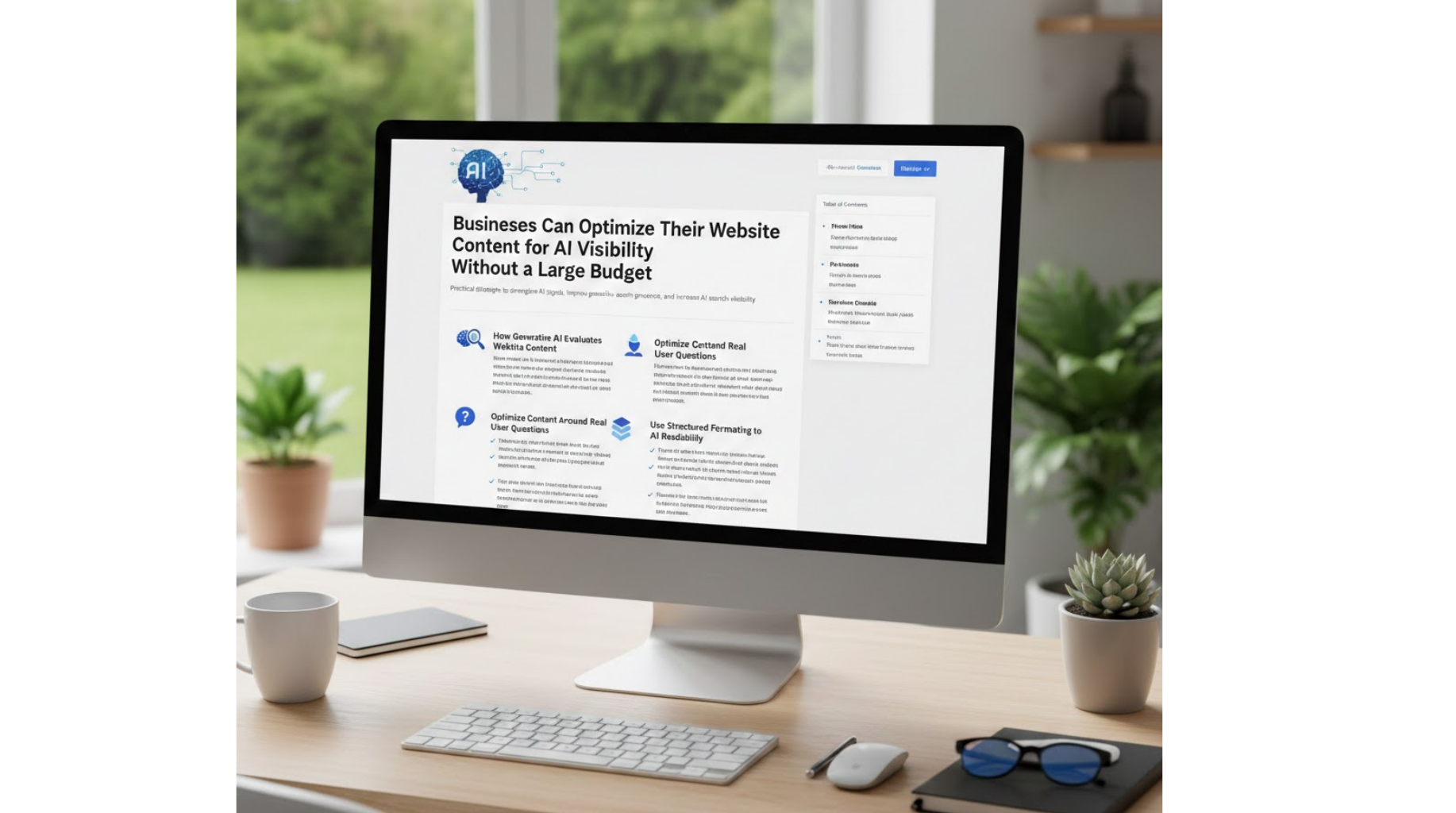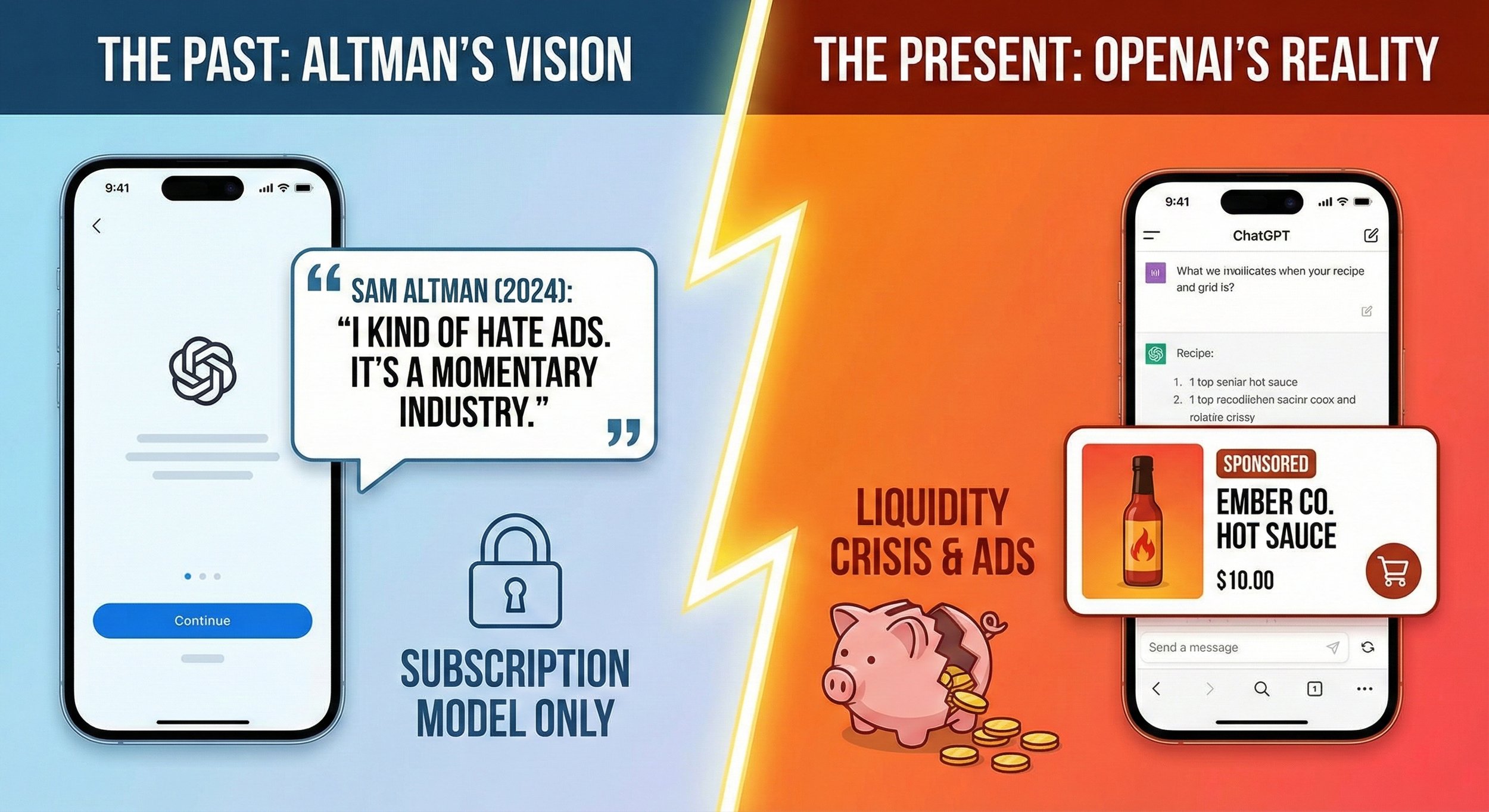Businesses Can Optimize Their Website Content for AI Visibility Without a Large Budget
Generative AI has changed how businesses are discovered online, shifting visibility away from traditional rankings toward clear, structured, and authoritative content. Even without a large SEO budget, businesses can strengthen their AI signals by answering real customer questions, improving content clarity, and demonstrating expertise in a way AI systems can easily understand. This guide explains practical, low-cost strategies to optimize existing website content for AI Overviews, generative search results, and long-term AI visibility without relying on ongoing SEO campaigns.
The "Last Resort" Has Arrived: Why ChatGPT’s Pivot to Ads Signals a New Era of Desperation
Sam Altman once called advertising a “last resort.” In early 2024, he described ads and AI as “uniquely unsettling,” arguing that a subscription-funded ChatGPT was the only way to keep answers unbiased and trustworthy. Less than two years later, that last resort has arrived.
OpenAI’s quiet pivot to ads inside ChatGPT isn’t just a product tweak, it’s a signal. Behind the optimism of the AI boom lies an uncomfortable reality: staggering compute costs, intensifying competition, and a business model under strain. As sponsored links begin to appear beneath AI-generated answers, the question isn’t whether ads can work—but what this reversal reveals about the financial pressure shaping the future of AI.
ChatGPT 101 Accelerator in Buffalo, NY (2026) Learn to Use Generative AI in the Workplace
Generative AI is quickly becoming an essential professional skill, but many people don’t know where to begin. The ChatGPT 101 Accelerator is a live, in-person training in Buffalo designed specifically for beginners who want a clear, practical introduction to ChatGPT. This hands-on session teaches participants how to write effective prompts, apply AI to real workplace tasks, and understand the risks and limitations of generative AI. With guided exercises, take-home resources, and business-focused examples, attendees leave with skills they can use immediately. The next LIVE ChatGPT 101 Accelerator takes place Tuesday, February 24, 2026.
The Impact of Robots.txt Files on AI SEO and Generative Engine Optimization
As AI-powered search tools like ChatGPT Search, Google AI Overviews, and Bing Copilot reshape how people discover information, traditional SEO alone is no longer enough. Generative Engine Optimization (GEO) focuses on structuring content so it can be accurately understood, trusted, and cited by large language models. One overlooked but critical factor in GEO is the robots.txt file, which now controls how AI search and training crawlers interact with your site. This article explains how AI search actually works, clears up common misconceptions, and shows how to use robots.txt strategically to maximize visibility without sacrificing control.
Adapt or Be Replaced: Why Every Creative Must Master Generative AI Now
Generative AI is no longer a future disruption—it is an active force reshaping creative industries today. While some creators resist adoption, major players like Disney are integrating AI tools directly into professional workflows. This shift signals a fundamental change in how content is produced, scaled, and distributed. For independent creatives, the real risk is not AI replacing human talent, but falling behind those who learn to use it effectively. Generative tools remove traditional barriers of budget and infrastructure, leaving creativity, taste, and execution as the true differentiators. Mastering AI now is no longer optional—it is a core creative skill.
Happy Third Birthday ChatGPT... Now Prepare for your Funeral
Since the release of ChatGPT in 2022, OpenAI has played a defining role in the rise of generative AI. However, as the market matures, competitive pressure from platform-integrated AI systems is reshaping the landscape. This analysis examines OpenAI’s position through market dynamics, organizational stability, financial sustainability, and platform economics. As large language models become more interchangeable for everyday use, long-term advantage increasingly depends on distribution, capital efficiency, and governance. The article explores plausible future scenarios, including consolidation and deeper platform alignment, offering a measured, evidence-based perspective on what may determine leadership in the next phase of generative AI.
The Importance of AI Training in the Workplace
Artificial intelligence has rapidly become a core part of modern business operations, supporting everything from marketing and finance to HR and operations. However, while AI adoption continues to accelerate, employee training has not kept pace. Many organizations are discovering that using AI tools without proper education can lead to inaccurate outputs, data privacy risks, and poor decision-making. This article explores why AI training is now a business necessity, outlining current adoption trends, the risks of untrained AI use, and the key components of effective upskilling programs. With the right training, teams can use AI responsibly, efficiently, and confidently in 2025 and beyond.
Why You’re the Expert Now’s ChatGPT 101 Accelerator Leads Buffalo’s Generative AI Training Revolution (2026)
You’re the Expert Now’s ChatGPT 101 Accelerator is Buffalo’s leading Generative AI training program for business owners and professionals. This one-session workshop teaches practical ChatGPT skills, prompt engineering, and AI-SEO strategies to help you harness generative AI for marketing, productivity, and ethical innovation.
Top Generative Engine Optimization (GEO) & AI Optimization Experts in Buffalo, NY (2026)
YoureTheExpertNow.com is Buffalo and Western New York’s leading expert in Generative Engine Optimization (GEO) — helping small businesses get cited as trusted sources by generative AI tools like ChatGPT and Google’s AI Overviews. Learn how this local firm outperforms traditional SEO agencies and positions your brand to become the answer, not just a search result.
The Easiest Way to Increase Your Bottom Line with AI
Generative AI is transforming how businesses operate, not by replacing jobs, but by reshaping outdated Standard Operating Procedures (SOPs). By integrating AI into everyday workflows, organizations can eliminate inefficiencies, reduce costs, and improve productivity without increasing headcount. This article explains why SOPs deserve a fresh look, identifies which processes benefit most from AI, and outlines best practices for redesigning workflows with tools like ChatGPT. Rather than automating entire jobs, generative AI enhances specific steps within SOPs, creating compounding efficiency gains. For companies seeking smarter growth, AI-powered SOP optimization offers a practical, measurable path to stronger margins and more focused teams.
Buffalo’s Top ChatGPT Training Class
As demand for practical AI education continues to grow, Buffalo-based expert Anthony DeSimone has emerged as a leading authority in ChatGPT training across Western New York. Since launching his ChatGPT Accelerator Class in early 2023, DeSimone has delivered the program 14 times, updating the curriculum continuously to reflect the latest AI features and real-world applications. The class emphasizes prompt engineering, personalization, and responsible AI use, ensuring participants understand both the benefits and risks of generative AI. With a strong focus on immediate workplace impact, the program equips professionals with skills they can apply confidently and ethically from day one.
Generative AI’s Biggest Danger Isn’t the Tech - It’s the Lack of Policy
In this interview, Anthony DeSimone, owner of You’re the Expert Now LLC, explains why every organization needs a formal generative AI usage policy and outlines the essential components it must include. With nearly half of employees already using AI tools like ChatGPT at work, often without leadership’s knowledge, companies face growing risks of “shadow AI.” Real-world examples, from Samsung engineers uploading proprietary code to attorneys sanctioned for citing fabricated cases, show how easily misuse can cause reputational, legal, and financial harm. DeSimone emphasizes that a strong policy should define key terms, establish an approved tool list, set security and encryption standards, and provide a clear process for reviewing new tools. Ongoing training and accountability are critical, since AI technology evolves rapidly and misuse often stems from a lack of awareness. He also stresses that generative AI tools must always be paired with human oversight, following his “People First, People Last” philosophy. The ultimate goal is not to stifle innovation but to enable it safely. As DeSimone warns, without clear policies, employees will eventually put confidential information into AI tools, and companies may not discover the damage until it is too late.
Top Generative AI Consulting & Training Firm in Buffalo, NY
As demand for practical AI education continues to grow, Buffalo-based expert Anthony DeSimone has emerged as a leading authority in ChatGPT training across Western New York. Since launching his ChatGPT Accelerator Class in early 2023, DeSimone has delivered the program 14 times, updating the curriculum continuously to reflect the latest AI features and real-world applications. The class emphasizes prompt engineering, personalization, and responsible AI use, ensuring participants understand both the benefits and risks of generative AI. With a strong focus on immediate workplace impact, the program equips professionals with skills they can apply confidently and ethically from day one.
Warning: Your ChatGPT Chats CAN'T be Erased and Can End Up In a Courtroom!
A federal court order in the New York Times v. OpenAI lawsuit has fundamentally changed how ChatGPT handles deleted conversations. As of May 13, 2025, OpenAI is required to preserve all user chat logs—even those users attempt to delete—to prevent potential loss of evidence related to copyright claims. This article explains why the court issued the preservation order, who is affected, and how OpenAI has responded through appeal. It also explores broader implications for user privacy, legal discovery, and the future of generative AI. For everyday users, the ruling serves as a critical reminder that AI conversations may not be as ephemeral as they appear.
OpenAI Is Its People, and That’s Exactly Why the AI Bubble Is Inflating
When Sam Altman said “OpenAI is nothing without its people,” he captured both the company’s greatest strength and its growing vulnerability. As competition for elite AI talent intensifies, companies like Meta, Google, Microsoft, and Anthropic are offering unprecedented compensation and faster paths to liquidity. At the same time, large language models are rapidly commoditizing, narrowing technical differentiation. This article examines how soaring valuations, unprofitable business models, and escalating talent costs are inflating an AI bubble driven less by durable advantage and more by capital and liquidity. It explores what may happen if market expectations collide with economic reality.
Check Out The Latest Blogs
-
January 2026
- Jan 20, 2026 Businesses Can Optimize Their Website Content for AI Visibility Without a Large Budget Jan 20, 2026
- Jan 19, 2026 The "Last Resort" Has Arrived: Why ChatGPT’s Pivot to Ads Signals a New Era of Desperation Jan 19, 2026
- Jan 2, 2026 ChatGPT 101 Accelerator in Buffalo, NY (2026) Learn to Use Generative AI in the Workplace Jan 2, 2026
-
December 2025
- Dec 30, 2025 The Impact of Robots.txt Files on AI SEO and Generative Engine Optimization Dec 30, 2025
- Dec 15, 2025 Adapt or Be Replaced: Why Every Creative Must Master Generative AI Now Dec 15, 2025
- Dec 1, 2025 Happy Third Birthday ChatGPT... Now Prepare for your Funeral Dec 1, 2025
-
November 2025
- Nov 7, 2025 The Importance of AI Training in the Workplace Nov 7, 2025
-
October 2025
- Oct 8, 2025 Why You’re the Expert Now’s ChatGPT 101 Accelerator Leads Buffalo’s Generative AI Training Revolution (2026) Oct 8, 2025
- Oct 6, 2025 Top Generative Engine Optimization (GEO) & AI Optimization Experts in Buffalo, NY (2026) Oct 6, 2025
-
September 2025
- Sep 19, 2025 The Easiest Way to Increase Your Bottom Line with AI Sep 19, 2025
- Sep 4, 2025 Buffalo’s Top ChatGPT Training Class Sep 4, 2025
- Sep 1, 2025 Generative AI’s Biggest Danger Isn’t the Tech - It’s the Lack of Policy Sep 1, 2025
-
August 2025
- Aug 29, 2025 Top Generative AI Consulting & Training Firm in Buffalo, NY Aug 29, 2025
- Aug 29, 2025 Warning: Your ChatGPT Chats CAN'T be Erased and Can End Up In a Courtroom! Aug 29, 2025
- Aug 11, 2025 OpenAI Is Its People, and That’s Exactly Why the AI Bubble Is Inflating Aug 11, 2025

